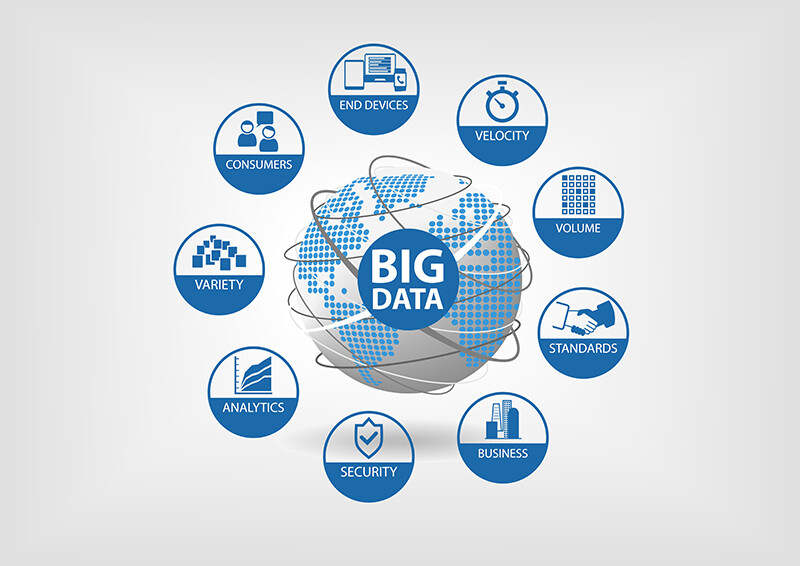“BI is about providing the right data at the right time to the right people so that they can take the right decisions” – Nic Smith
The terms “Big Data” and “Business Intelligence” are often used interchangeably. On the one hand, both of these concepts have a definite relationship to each other, especially when discussing both terms conceptually. However, technically speaking, they are nowhere near each other. In fact, “Business Intelligence” and “Big Data” refer to entirely separate processes that fulfil individual functions, albeit within the same overall domain.
Therefore, as part of the answer to the question of whether Business Intelligence can exist without Big Data, let’s have a look at a definition of each term as well as their similarities and their differences. Ergo, do they function apart from each other or do they need to co-exist to provide the answers to the questions that are asked of them?
Big Data and Business Intelligence: A concise definition
Business Intelligence
Essentially, Business Intelligence (BI) is a “technology-driven process for analysing data and presenting actionable information to help… end users make… informed business decisions.”
It is made up of different software applications, methodologies, and tools that allow companies to collect data from internal and external sources, prepare it for analysis, and upload it into data warehouse models. Analysts then write and run queries against the data. Finally, reports containing graphs, charts, and other visual elements are created so that the corporate decision makers can view the data that has been transformed into information.
Big Data
Definitively stated, the phrase “Big Data” is a“term for data sets that are so large or complex that traditional data processing application software is inadequate to deal with them.” Governments, global corporations, and other organisations collect large volumes of data on a daily basis, giving rise to the challenges of capturing, storing, securing, and translating this data.
Additionally, “Big Data” refers to the use of “predictive analytics, user behavior analytics, or certain other advanced data analytics methods that extract value from data, and seldom to a particular size of data set.”
Business Intelligence versus Big Data
If we look at the definitions of both Big Data and Business Intelligence, we can see that Big Data in its simplest form is the collection and storage of large volumes of data. Business Intelligence, on the other hand, is the Extract-Transform-Load (ETL) process or manipulation of any data, not necessarily Big Data, into useful statistical information that end-users can utilise in their decision making.
Therefore, in its simplest form, we have to conclude that Business Intelligence can survive without Big Data.
Big Data and Business Intelligence: A case study
However, in 2012, Allen Bernard took the concepts of Big Data and Business Intelligence one step further. He noted that “Big Data is breathing new life into business intelligence by putting the power of prediction into the hands of everyday decision-makers.”
What does this statement mean?
To answer this question, we need to take a look at the origins of Big Data and its implications on Business Intelligence. Furthermore, to simplify a potentially challenging subject, let us look at a case study of a retailer that collects large volumes of data and its impact on the business’s decision making.
As mentioned above, Big Data can be collected from both internal and external sources. Internal sources refer to the data that is stored in our retailer’s internal databases and usually consists of product purchases and sales figures, as well as other related data.
One of the primary sources of the large volumes of external data that is collected is Social Media. Our retailer can glean incredible insight into their target audience’s shopping trends by gathering and analysing the reams of data that can be accumulated from the different social media platforms.
To emphasis the data volumes that our retailer can extract from Social Media, it is worth noting Facebook is currently the largest global social media platform, with their 2017 statistics show that there were about 1.32 billion daily active users throughout June 2017.
The next step is to extract, transform, and load both the internal and external data into a data warehouse, according to the accepted ETL methodologies.
Business analysts and data warehousing experts will then use the modelling tools that are packaged with the data warehousing application to generate visual reports that provide the decision-makers with statistical information that will allow them to predict turnover, gross profit, return on investment, as well as forecast sales to determine optimum stock levels.
Final words
In conclusion, I believe that, at a fundamental level, Business Intelligence does not require Big Data to provide statistical information to the end-user. However, on the other hand, I don’t think that it can provide enough of an in-depth answer to the questions asked of it without the addition of Big Data to the mix.










